HAIDER ALA HAMOUDI is associate professor of law at the University of Pittsburgh. He is the author of the memoir Howling in Mesopotamia.
The University of Chicago Press, Chicago 60637
The University of Chicago Press, Ltd., London
2014 by The University of Chicago
All rights reserved. Published 2014.
Printed in the United States of America
23 22 21 20 19 18 17 16 15 14 1 2 3 4 5
ISBN-13: 978-0-226-31534-8 (cloth)
ISBN-13: 978-0-226-06882-4 (paper)
ISBN-13: 978-0-226-06879-4 (e-book)
DOI: 10.7208/chicago/9780226068794.001.0001
Library of Congress Cataloging-in-Publication Data
Hamoudi, Haider Ala, author.
Negotiating in civil conflict : constitutional construction and imperfect bargaining in Iraq / Haider Ala Hamoudi.
pages cm
Includes bibliographical references and index.
ISBN 978-0-226-31534-8 (hardcover : alkaline paper)ISBN 978-0-226-06882-4 (paperback : alkaline paper)ISBN 978-0-226-06879-4 (e-book)
1. Constitutional lawIraqInterpretation and constructionHistory21st century. 2. Constitutional historyIraq. 3. Representative government and representationIraq. 4. Federal governmentIraq. 5. IraqPolitics and government2003 I. Title.
KMJ2220.H36 2013
342.56702'9dc23
2013000524

This paper meets the requirements of ANSI/NISO Z39.48-1992 (Permanence of Paper).
Acknowledgments
In the spring of 2009, I was offered an extraordinary opportunity to travel to Iraq and work directly with its Council of Representatives Constitutional Review Committee, the body tasked with developing consensual amendments to Iraqs 2005 Constitution. Though the process did not lead to any significant legislative achievement, so much of what I have learned about the Iraqi constitutional project arises from that experience that I cannot imagine having been able to write this book without it. Therefore, at the outset, I would like to thank the scholars, colleagues, and friends at the University of Utah S. J. Quinney School of Law and Global Justice Project (Iraq) for the opportunity to participate in that wonderful yearlong adventure. Specifically, my gratitude extends to the following individuals: Hiram Chodosh, dean of the School of Law, for leading the effort despite substantial, indeed overwhelming, obligations elsewhere; Wayne McCormack, a constitutional scholar and a gentleman, for his always valuable insights and suggestions; fellow Iraqis Muayyad Al-Chalabi, Wasfi al-Sharaa, and Joanne Dickow, whose splendid company made life so much more bearable under the trying circumstances in which we found ourselves; the decidedly non-Iraqis Andrew Allen and ambassador Vincent Battle, of whom much the same must be said; and the many, many others, dear friends all, involved in the projectZahir al-Tai, Qabas Adnan, Ahmed Mahmoud, Jaye Sitton, Kirsti Samuels, Jim Holbrook, Sean Gralton, Ali al-Rikabi, Ali Abdul Wahid, Suad Ahmed, Linda Sami, Kathy Christiansen, and Markus Zimmer. But above all, special thanks to professor Chibli Mallat, whose scholarship respecting the Arab and Islamic worlds knows no peer; whose longstanding efforts on behalf of and dedication to Iraq are well known to all associated with it; and whose generosity of spirit, and of time, to support those junior to him provides a model and inspiration to any younger, aspiring scholar.
Once in Iraq, of course, little could be achieved without the substantial cooperation and support of the American Embassy, and in this vein I would like to thank April Powell-Willingham, Patricia Wildermuth, and Barbara Mulvaney of the Constitutional and Legislative Affairs Office. I also wish to thank the dedicated Iraqi Americans who worked for them and who went well above and beyond dutys call to make us feel welcome and help us in our tasks: Atir A. Attar, Andy Berzinji, Ali Shaker Al-Khuzaii, and Alan Zangana.
Deep gratitude and appreciation also extend to the Iraqis themselves with whom I worked and who provided hours and hours of uncompensated but much-needed help: Hasan al-Yasiri and Salim al-Jibouri, among the sharpest legal minds in Iraq today; Fariad Rawanduzi, Ali Allaq, and Abbas Bayati, more generous with their time than I ever could have expected; and foremost among them, the chair of the Constitutional Review Committee and the sole keeper of many documents related to the Iraq constitutional effort, my paternal uncle, Sheikh Humam Hamoudi, along with his dedicated staffespecially (but not exclusively) Ali Fadhil, his chief of staff, and Abu Fatima, whose near-daily efforts and indefatigable patience dealing with my various demands deserve more credit than I am able to provide.
In the writing of the book, its editing, and its advancement to print, I must thank a number of people as well. Specifically, I am grateful to the members of the junior faculty forum at the University of Pittsburgh School of LawJessie Allen, Mirit Eyal-Cohen, Jasmine Gonzales Rose, and Charles Jallohand my more senior colleagues Jules Lobel and George Taylor, each of whom read full manuscripts not once but twice, and offered invaluable guidance whenever I requested it. I give my thanks also to Michael Dorf, Nathan Brown, and Mark Tushnet, who offered extremely helpful comments on select chapters of early drafts. And of course, I am indebted to my dean during this daunting endeavor, Mary Crossley, who offered me time when I needed it, funds when I begged for them, and encouragement at all times. Any errors or omissions that remain are my responsibility alone.
Among Iraq hands, the greatest thanks must go to three individuals, all dear friends, with whom I rarely agree on matters relating to Iraq and yet without whose consistent, intelligent, and probing criticisms this work would be much weaker. They are Rend Al-Raheem, whose dedication to Iraq and matters relating to Iraqi law through the Iraq Foundation is astonishing; Jason Gluck of the United States Institute of Peace, who never let a single word with which he might disagree go unmentioned; and ambassador Feisal Amin Rasoul al-Istrabadi, a University Scholar in International Law and Diplomacy at the Maurer School of Law at Indiana University, as formalist as I am realist, and yet one whose work concerning Iraqi law has no parallel, whose knowledge of the subtleties and complexities of the Iraqi political landscape is as nuanced as I have seen it, and whoeven though I think him wrong frequentlyaspires to a form of honorable and civilized debate that is altogether lacking in these excessive, polemical times of ours. Feisal continues to threaten to return to the world of diplomacy, and for the sake of the legal academy, I fervently hope this does not come to pass.

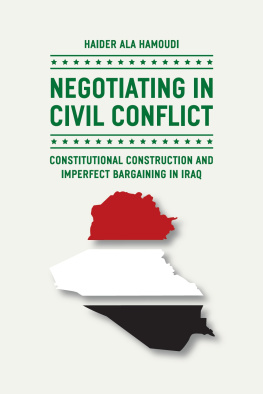
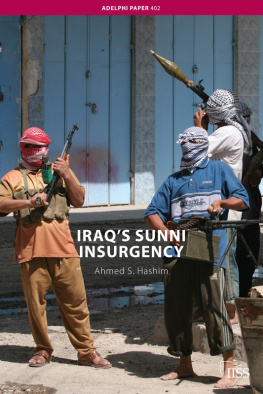

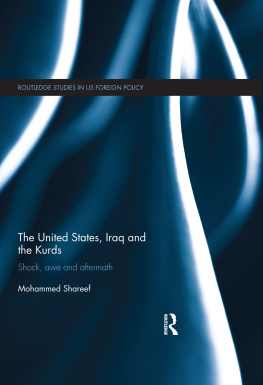
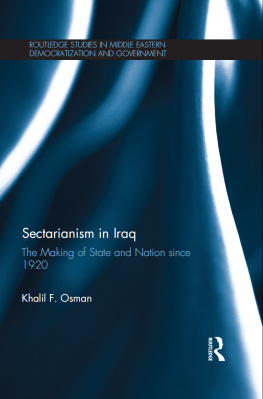
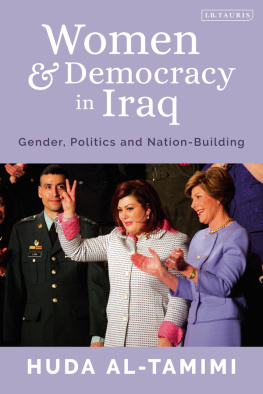
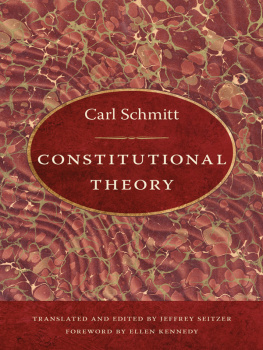
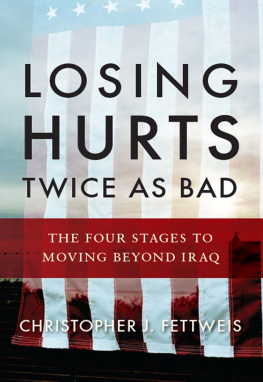

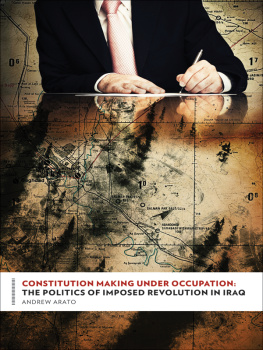
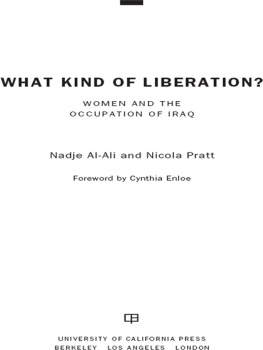
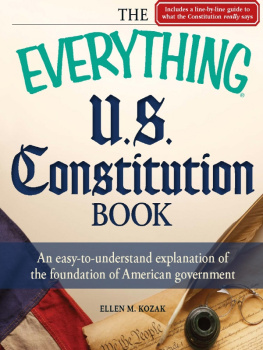
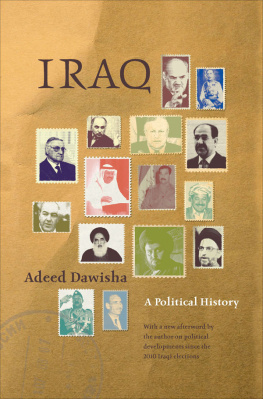
 This paper meets the requirements of ANSI/NISO Z39.48-1992 (Permanence of Paper).
This paper meets the requirements of ANSI/NISO Z39.48-1992 (Permanence of Paper).